High Court Criminal Trials
High Court Criminal Trials
The National Records of Scotland (NRS) have catalogued and indexed all criminal trials held in the High Court of Justiciary between the years 1800 and 1994. High Court trials are heard before a judge sitting with a jury (15 persons) and are known as 'solemn trials'. The court sits permanently in Edinburgh and travels on circuit around Scotland. As Scotland's supreme criminal court, cases heard before the High Court tend to be for crimes such as murder, rape, treason and other serious offences. In the 19th century repeat offenders, or persons deemed criminals 'by habit and repute', could be tried there for lesser crimes such as theft, or housebreaking (burglary in England and Wales). During the first half of that century many convictions for such offences ended with a sentence of transportation. For more advice on this, go to our guide on crime and criminals.
For the most serious criminal cases two groups of records usually survive. Firstly there are the precognitions: written reports of statements given by witnesses and frequently the accused, prepared by the Crown (as prosecutor) which are contained among the records of the Lord Advocate’s Department (NRS references AD14 and AD15). Secondly, there are the records of the High Court itself, the primary sources to consult being the minute books, which summarise trial proceedings, and the process or case papers (NRS reference JC26). Cataloguing of the early 19th century case papers is not yet complete, but staff in the NRS are working to fill the gaps.
This extensive cataloguing work has now made it easy to search for the trials between the years 1800 and 1930 online. The trial records themselves can be viewed only by visiting the NRS Historical Search Room.
This guide tells you how to search the online catalogue for criminals, crimes and victims; make sense of the results; view the documents and what to do if you don't find the trial you are looking for.
Searching the online catalogue
You can search for the records of a trial in the NRS online catalogue, but before doing so you should read the guidance below.
Searching for criminals
When searching for an accused person, it is best to narrow your search to the relevant record group by typing 'AD14', 'AD15'or 'JC26' as a reference in the Reference field of the search page. For example, if you were looking for the trial of John Donaldson, you would enter 'John Donaldson' in the Any Text field, and 'AD14' for 19th century precognitions, 'AD15' for 20th century precognitions, or 'JC26' for the case papers in the Reference field. If the trial date is known, a year date in the Date field may also be added, as shown below:
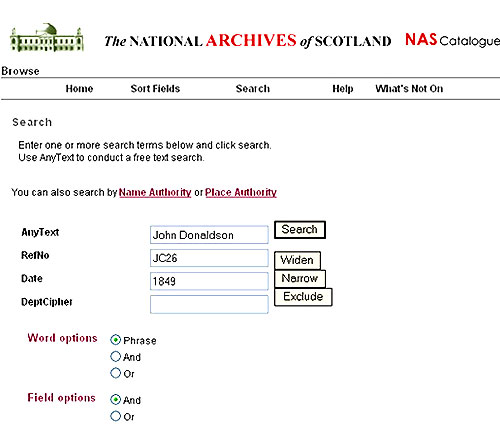
Searching for crimes
If you simply wish to search for a particular type of crime, then you would enter the term 'murder', 'theft' or 'housebreaking' in the Any Text field. Please note that terms such as 'burglary', 'manslaughter', 'assault and battery'or 'arson' will produce no results, as these are not recognised criminal forms of indictment under Scots Law. The Scottish equivalents are 'housebreaking', 'culpable homicide', 'assault to the injury of the person' and 'wilful fire-rising'. Find out the meaning of some Scots legal terms in our index to legal terms and offences libelled.
Searching for victims
If you simply wish to search for a victim of crime, then you would search under the name of the victim as with the accused person search. Please note that information about victims remains incomplete, but staff in the NRS are working to fill the gaps.
Making sense of the results
A typical example of an online catalogue entry for a High Court criminal trial appears below.
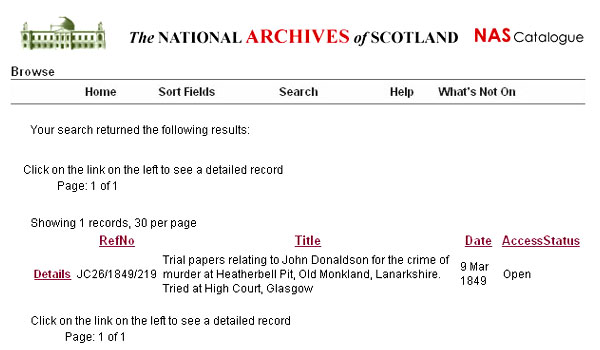
When you click on the link called 'Details' a more detailed description of the item will appear:
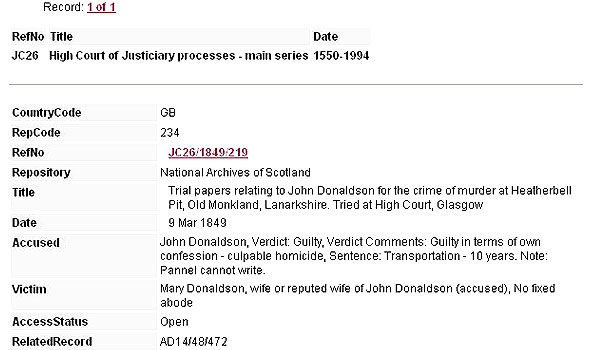
Below is an explanation of each part of the catalogue entry.
CountryCode and RepCode
These are the identifying codes (ARCHON codes) for the National Records of Scotland. They are not required when ordering documents.
RefNo
This is the reference number of a specific trial or Crown Office precognition to quote when you wish to see the papers in the NRS search rooms.
Title
This gives the name of the accused; the crime(s) with which they were charged; and the place of trial. The information has been obtained from the court minute books and case papers. Where a trial shifts to another court, the details will be recorded within the information about the accused.
Date
This is the date of first appearance of the accused at court. It may vary from the final sentencing date, particularly if the case lasted for several days, or was postponed to a later court sitting.
Accused
This contains details about the accused including forename; surname; alias; crime accused; place of crime (though not in every case); verdict, and any comments on the verdict; court sentence and term, for example Transportation – 10 years; previous convictions, where known; and any notes or interesting facts identified, either about the accused (the pannel) or the case, for example 'Pannel cannot write' or 'Speaks only Gaelic'.
Victim
This contains details about the victims of the crimes committed, but the information is far from complete and NRS staff are working to fill the gaps. For more serious offences such as murder or culpable homicide, victim details have been abstracted in most cases. For reasons relating to Data Protection or confidentiality, victim details have been deliberately excluded for cases less than 100 years old. The last trial date containing victim information is for the year 1905.
AccessStatus
The access status of the precognitions and trials to the year 1914 are 'open', which means that they are not affected by closure rules relating to Data Protection or confidentiality.
Related Record
This contains references to related record material such as precognitions (in the case of JC26 papers) or case papers (in the case of the precognitions). Precognition information gives much fuller personal information about the accused as shown in the equivalent AD14 entry for 'John Donaldson'. The information may vary depending on the detail given within the original record.
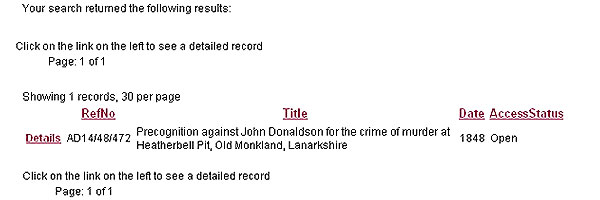
Clicking on the 'Details' link will give you this page:
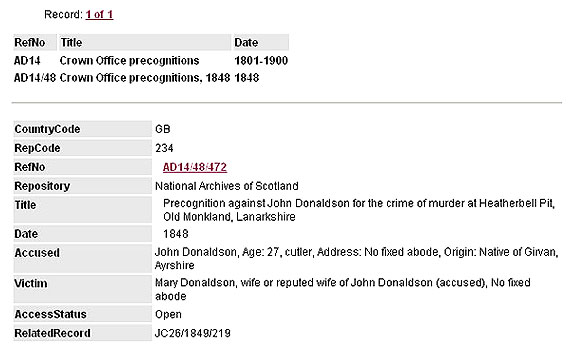
FindingAids
A database, known as the Solemn Database, exists as a separate search tool in the Historical Search Room. All the data within it are included in the online catalogue on this website. For more information about images of trial documents linked to this database see the paragraph on Viewing the documents, which is below.
Viewing the documents
All AD14, AD15 precognitions and JC26 trial papers may be seen in the NRS Historical Search Room.
Some trial minute books for the 19th century have been digitised, and these images may be seen without charge using our High Court Criminal Trials database. The database permits structured searches to be undertaken using additional search terms, and provides a direct link to images of those volumes which have been digitised. They are linked to the Virtual Volumes resource in the Historical Search Room, but are not available online. For more information about the precognitions, trial papers and minute book images, and ordering copies contact the Historical Search Room. If you intend to visit in person, read advice about obtaining a reader's ticket and visiting the NRS search rooms.
If you don't find the trial you are looking for
Many precognitions and trial papers did not survive, therefore searching under the above parameters may fail to glean any results. This could be either because the papers have not survived, or the case papers (JC26) have yet to be catalogued or indexed. Years which are currently catalogued in full are 1800, 1833-37, 1840-1930.
However, all trials from 1800 have been indexed using the minute books. As part of a cross-check, it is therefore worthwhile searching under the name of the accused and the minute book series reference. The minute book series references are JC8, JC9, JC11, JC12 and JC13. Any trial, which has neither surviving precognition nor case papers will be linked to its relevant minute book entry to ensure that the details of the case are not lost to researchers. Search by entering the name of the accused in the 'Any Text' field, and the series reference of the minute book in the 'RefNo' field, for example 'JC8'.
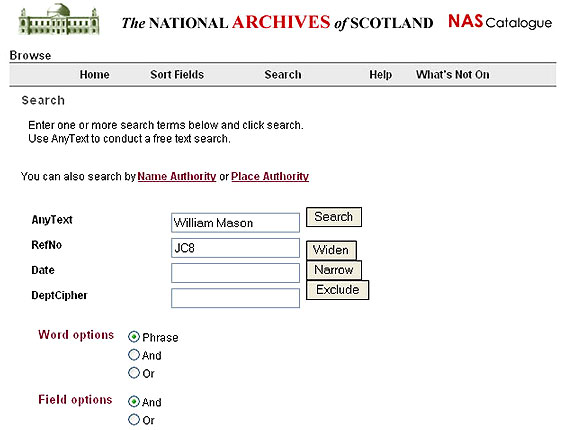
Clicking on the 'Search' button should show this page:
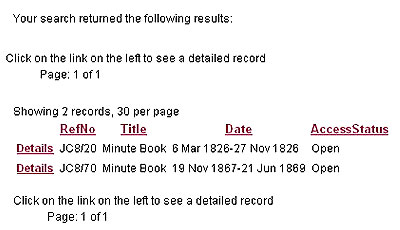
When you click on the 'Details' link for JC8/20 you will see this page:
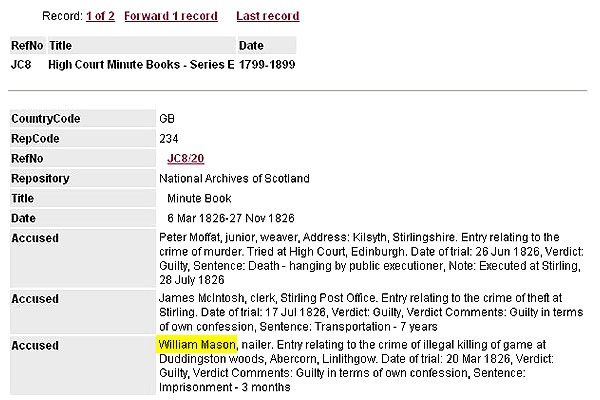
Such searching will frequently identify individuals who 'Failed to appear for Assize' (jurors who failed to attend for jury selection, and who were fined by the court for their non-attendance). Some Scots legal terms such as 'assize' are explained in our index to legal terms and offences libelled.
If you still cannot find your trial, it may be that it was brought before an inferior court, in particular the sheriff courts, whose criminal records have not been catalogued in detail. For more advice on this go to our guide on crime and criminals.